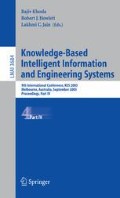Abstract
A Logic of Multiple-valued Argumentation LMA was formalized by Takahashi and Sawamura (LMA) on an expressive knowledge representation language, Extended Annotated Logic Programming (EALP). LMA allows agents to construct arguments under uncertain knowledge and to argue with other agents on uncertain issues in the open networked heterogeneous environment. In this paper, we describe an implementation of LMA (called AASLMA) in which agent communication is realized in C and symbolic argument construction in Prolog. The interface design proper to argumentation is also taken into account in the implementation. This is helpful for us to understand argument processes and results. The versatility of LMA is shown through the implementation and some convincing argument examples that employ various types of multiple-valuedness.
Access this chapter
Tax calculation will be finalised at checkout
Purchases are for personal use only
Preview
Unable to display preview. Download preview PDF.
References
Chesnevar, C.I., Maguitman, G., Loui, R.P.: Logical models of argument. ACM Computing Surveys 32, 337–383 (2000)
Dung, P.M.: An argumentation semantics for logic programming with explicit negation. In: Proc. of 10th Int. Conference on Logic Programming, pp. 616–630 (1993)
Kifer, M., Lozinskii, E.L.: A logic for reasoning with inconsistency. J. of Automated Reasoning 9, 179–215 (1992)
Kifer, M., Subrahmanian, V.S.: Theory of generalized annotated logic programming and its applications. J. of Logic Programming 12, 335–397 (1992)
Nisbett, R.E.: The Geography of Thought: How Asians and Westerners Think Differently.. and Why. The Free Press (2003)
Reed, C., Norman, T.J. (eds.): Argumentation Machines. Kluwer Academinc Publishers, Dordrecht (2004)
Sawamura, H., Maeda, S.: An argumentation-based model of multi-agent systems. In: Information Modeling and Knowledge Base XII, pp. 137–150. IOS Press, Amsterdam (2001)
Sawamura, H., Mares, E.: How agents should exploit tetralemma with an eastern mind in argumentation. In: Barley, M.W., Kasabov, N. (eds.) PRIMA 2004. LNCS (LNAI), vol. 3371, pp. 259–278. Springer, Heidelberg (2005)
Takahashi, T., Sawamura, H.: A logic of multiple-valued argumentation. In: Proceedings of the third international joint conference on Autonomous Agents and Multi Agent Systems (AAMAS’2004), pp. 800–807. ACM, New York (2004)
Author information
Authors and Affiliations
Editor information
Editors and Affiliations
Rights and permissions
Copyright information
© 2005 Springer-Verlag Berlin Heidelberg
About this paper
Cite this paper
Matsunaga, K., Sawamura, H. (2005). AASLMA: An Automated Argument System Based on Logic of Multiple-Valued Argumentation. In: Khosla, R., Howlett, R.J., Jain, L.C. (eds) Knowledge-Based Intelligent Information and Engineering Systems. KES 2005. Lecture Notes in Computer Science(), vol 3684. Springer, Berlin, Heidelberg. https://doi.org/10.1007/11554028_116
Download citation
DOI: https://doi.org/10.1007/11554028_116
Publisher Name: Springer, Berlin, Heidelberg
Print ISBN: 978-3-540-28897-8
Online ISBN: 978-3-540-31997-9
eBook Packages: Computer ScienceComputer Science (R0)

